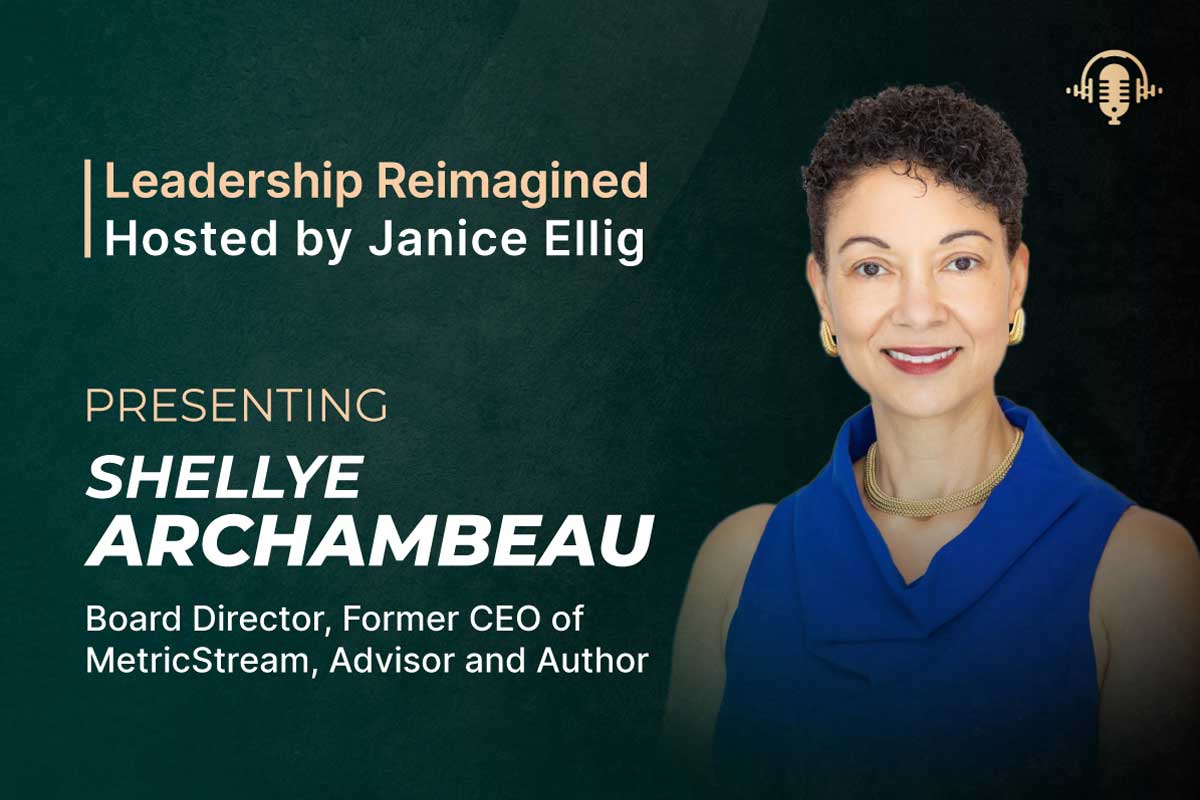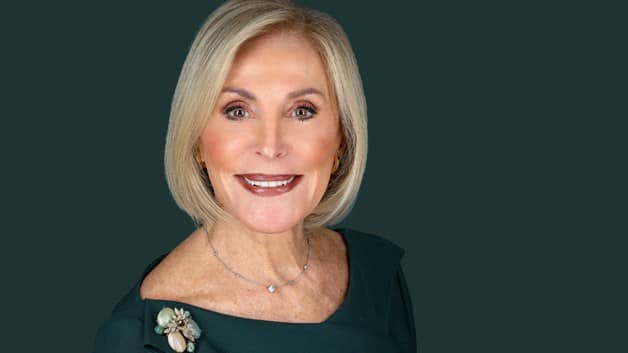An Unapologetically and Ambitious CEO

Leadership Reimagined is available on the following popular podcast stations:
Show Notes: Shellye Archambeau
Shellye Archambeau on why she prefers the term “work-life integration” to “work-life balance”
Silicon Valley is definitely not female- or family-friendly, although it’s a little better now than it was. Some companies are indeed trying. The whole reason I don’t like the word “balance” is that I think it sets us up from the start for failure. Because what is a balance? It’s a metal structure with two weights on either side that are equal at all times. Frankly, life throws a lot of things at us, and there’s no way that we can make sure that we hold our personal and professional lives absolutely even at all times. There are times when we need to put more of our focus on work, or more on family, or on personal self-care, or whatever it might be. And that’s okay. The key, though, is to integrate over time so that you get done what needs to get done. The way I try to do it is to prioritize ruthlessly: “what do I need to get done professionally and personally?” I put those things together, and then I reprioritize so that what’s important in my life gets done. There’s no way to do everything that everybody wants you to do. So inevitably, there will be things that you’re just not going to get to. And you have to either learn to live with that or find somebody else to do it. And that’s the way I approach things. I ask myself, “am I the best person to do whatever it is that’s on my plate?” You’d be surprised – when you ask yourself that question, you find that many times you’re actually not. You can do it, but that doesn’t mean you’re the best person to do it. So if you’re not, go find the best person!
Shellye Archambeau on letting go of responsibility
Shellye Archambeau on growth from trauma
Shellye Archambeau remembers a life lesson from her mother
Shellye Archambeau defines being “Unapologetically Ambitious”
Shellye Archambeau on working in Japan as a Black woman
Shellye Archambeau on a pivotal moment in her career at IBM
Janice Ellig:
I want to go to your time at IBM, because there was a point at which you walked into your boss’s office to resign. You’d talked about this with your husband the night before over a glass of wine. You walked into your boss’s office and said, “they’re not putting me where I want to be, and it breaks my heart that I can’t achieve my ambitions here at IBM.” And a few days later, you got a significant promotion. And that was all about telling them what you wanted. You pushed the envelope there. That was a bold declaration. What gave you that courage and self-confidence, to take that type of risk?
It was such a scary thing to do. I was only about seven years into my career at that point. And I don’t know that it was that I had the courage so much as it was that if I didn’t do it, I wasn’t going to achieve my objectives. So I felt I really didn’t have a choice. They put me in such a bad position that I was going to have to leave. And that’s literally what I said: “I don’t want to go, but you’re forcing me to because I can’t achieve my objectives here. That’s what you’re telling me.”
I think resigning in that way also helped. I didn’t walk in and say, “I quit, I found a better job” as much as I said, “you forced me to do this, and therefore I found another job because you’ve told me there are no promotion opportunities here.” And I really didn’t expect what happened. I was shocked. I didn’t realize that they’d come back with a counteroffer. I really thought I was leaving. That really reinforced the importance of making your needs known. But the other thing I learned is that if you are providing significant value, and your company wants you there, they will work hard to keep you. So you do have some power now. You can’t be walking into the company and resigning every year to try to go get promoted. That’s not a strategy in and of itself, for sure, but in general, if you’re good at what you do, and you’re really adding value, make sure the company knows what you want, because many times they do want to figure out how to keep you.
Shellye Archambeau on why she chose to enter the tech industry
Shellye Archambeau on starting her first CEO job with a bold move
Janice Ellig: In December 2002, you achieved your first CEO position. Can you tell our audience about the bold question you asked the Chairman? You asked whether he was hiring you to execute his strategy or hiring you to be the CEO. And what unfolded from there? Let me just give a little bit of context. I was going in to meet with the Chairman. He’s Vinod Kosla, a partner in the Kleiner Perkins Venture Capital Company. I had done a lot of research on him, and he’s smart, but he’s also really aggressive. He tends to be demanding. He also tends to be very forceful. He tends to whipsaw some of his CEOs. So I walked into this meeting, and I knew he was going to make me an offer, but I couldn’t accept the offer unless I knew how he was hiring me, whether it was just to be his minion and do his bidding or to really be CEO of the company. And I have to tell you, it was another scary moment, because I worried he was going to throw me out of his office. So I asked the question, and then there was silence. He just looked at me with these really strong eyes. Just looked at me. I was thinking, “oh my God, I’ve totally blown this.” And then finally, a little smile crept up the edges of his lips, and he said, “Shellye, I can be forceful and I have strong opinions, but I hire CEOs to be CEOs.” And I said, “okay, then I’ll accept the job.” One of the things that that conversation did for me was give me power, because I didn’t always do what he wanted me to do. But I knew we’d had the conversation, and he knew we’d had the conversation, so therefore, I was able to do what I felt was right. And only once did I come home and tell my husband, “all right, I’m doing something completely opposite from what Vinod wants me to do. So when I come home tomorrow, I may not have a job, because that’s his choice.” And sure enough, when I told Vinod what I had decided, and it wasn’t what he wanted, again, silence. He looked at me and said, “okay, but you better be right,” which I could live with.
Shellye Archambeau on calculating risks and avoiding the “glass cliff”
Shellye Archambeau on making “choices” instead of “sacrifices”
Shellye Archambeau on coping with setbacks without letting them limit your goals
The first thing I did was find the right life partner. My late husband was the love of my life, and he was an amazing partner. And that makes such a huge difference. So when it came to making decisions, making some trade offs, moving around, figuring out how to get everything done, we were in it together, and that really, really mattered. Second, I ask for help. I tell people all the time that asking for help is not a weakness, it’s a strength, because no one in this world does anything of significance all by themselves. Nobody. So don’t think you’re going to be the first one to do it. Get help. I’ve found that when asked the right way, most people are actually happy to be helpful. For example, when taking a new job, don’t show up first day without having talked to people who have already done the job before. Whether it’s in your industry or a different industry, go find them, talk to them, figure out what pitfalls you should avoid and what can help you be successful. When you’re going through challenging times, let people know. You’d be surprised how people will help. If my husband’s health was in really bad shape, I had friends cooking meals for me and dropping them off, taking him to doctor’s appointments, doing all kinds of things so I could stay working. You just never know what people will do for you unless you give them the opportunity.
Shellye Archambeau on living with grief
Shellye Archambeau’s parting advice
It is never too late to begin being intentional. So think about what you really want, and then go after it. It’s really straightforward. I just ask myself, “what is it I want?” And if what you want is to lead a nonprofit, or to create an organization, or to be on a board – whatever it might be, you set yourself the goal and then ask yourself, “what has to be true for me to achieve this?” Which means you usually have to go do some research. I’m a big believer in research. And then once you find out what has to be true, ask yourself, “how do I make it true for me?” And that becomes your plan. That’s what I’ve done with absolutely everything. “What do I want? What has to be true to get it? And how do I make it true for me?” I firmly believe that anyone can achieve their aspirations if they’re willing to be intentional about it, make tradeoffs and take help along the way. And I do want everyone to be able to do it. There’s so much talent and capability wasted because too many people don’t.


